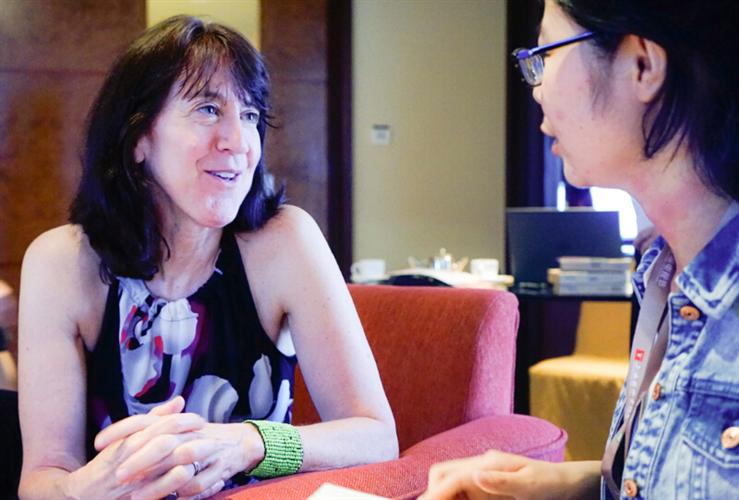Documentary Filmmakers Hitch Their Craft to a Passion for Changing the World

Vossen\'s attitude towards documentaries has instrucfiveness.
We are now living in a world where everything has its own price, especially in the field of filmmaking. Film production today is the equivalent of making a business deal. The box office always gets priority, under any circumstances. So why do we still need documentaries in the film industry? “Instead of aiming for financial goals, we are making documentaries to impact people’s life and change the world," says Lois Vossen, a famous American documentary director. I’m not sure whether this artist is an idealist or not, but her attitude towards documentaries and how to make films is an example for the entire world.
Daily News: As a founder and executive producer of “Independent Lens”, a famous documentary program, what personal criteria do you use to judge a documentary work?
Vossen: We\'re usually looking for something that is very new. I expect the documentary to be about a subject I have heard about, or somebody that I’ve never heard about. So, first of all, it must be different to other films. Then, of course, it’s about telling a story that captures the audience\'s attention.
Daily News: Sounds quite professional, like the theme must be very unique, and representing different culture?
Vossen: Yes, absolutely. I’m looking for stories that are more unique than other films. So, show me another world that I’ve never been a part of.
Daily News: America is a superstar in terms of making documentaries. Can you share some insight into why?
Vossen: Most social documentaries don’t make much money, it’s a non-profit game and the documentary filmmakers are doing it out of passion or commitment. And they rely on funding from the U.S. government, from foundations and the private sector. So financial return is actually pretty small.
It\'s very rare for a documentary film to make a lot of money. Some of them do, but most don’t because it’s not the film type that people pay a lot of money to see in the cinema, although millions of people do watch them on television. In terms of the process, we get thousands of proposals a year and we sift through them until we find a project that fits best and is appropriate for our funds. We try to narrow them down to a small group, then we try several different funding initiatives.
One is called “open call” and it allows any independent filmmaker in the U.S. to apply. We also have a development fund through which we specifically look for new filmmakers. We give them a small amount of money to develop the project and to be more competitive for larger funding sources.
We have another initiative called the "special project." This is used when I find a project I think is really perfect for us and we commission it in our right. Our filmmakers produce it independently in collaboration with funders from across the United States and around the world. The cost of documentary-making is high and we are usually unable to provide the full funding. So we cooperate with different organizations, like the BBC, and others in England and France, and a huge range of foundations or funders across the United States.
Daily News: None of the projects sound very profitable but you still devote so much energy and capital to them. Because it is a great dream?
Vossen: Yes, it’s about a way to change the world and try to impact people. Our filmmakers are really in it because they want to tell stories they think will bring about changes and better the life of people. So they are doing it out of commitment rather than out of financial goals.
Daily News: Like if there is a child who watches the documentary and grows up to become a politician to change the world?
Vossen: These are the things which are the most rewarding. We have people who call in and say they had prejudice against a certain group of people their whole life, but after watching the documentary they realized those people were actually like them and they shouldn’t hold those prejudices. We have people who decided to change the way they live, so they reduced their environment pollution. These are our best wins. And the really incredible part of all this is the documentary filmmakers. They are the real heroes, people who spend years to tell their stories and get the films made.
Daily News: China has a very profound history, and many fabulous stories to be told. So, you might cooperate with us in the future?
Vossen: We\'ve actually worked with several Chinese filmmakers. We did a wonderful film called “Last 20 homes”. And, of course, I’m familiar with so many Chinese great documentaries.
Daily News: Could you share with us your favorite film type?Like comedy?
Vossen: Well, I love comedy. It’s wonderful if you can find a documentary that has humor, but they are few and far between. My real heart is in social issues documentary. This involves the great problems and stories of our time, such as values in America and issues around people who have been under-represented in the media. All of these big issues.
Daily News: So the audience response is the best part?
Vossen: Yes, it is. To know that you can change people’s lives. That people start thinking about things they never thought of before. Also, we do need many more female directors in America. There are still many more men than women, so we need to encourage more women.



